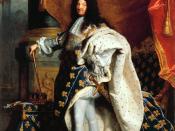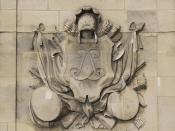Absolutism is the sovereign power or ultimate authority in the state and layed power in the hands of the King who claimed power due to divinity. The government of France in the 17th century couldn't be labeled an absolute monarchical government because it depended on limited political realities. The king relied on ministers, nobles and peasants, to control people and their control would fall short of the aspirations of the King due to overlapping authorities. In order for absolutism to exist in France the government would need to control the social, political, and economical lives of all the residence of France. King Louis XIV was the closest King to obtaining absolutism, people considered his version of absolutism to be the best but even that could not reach the full pentacle of absolutism.
During the 17th century in France the King Louis XIV's reign was the best example of absolutism. The social status of French culture, which also included language and manner was visible throughout Europe.
Nobility however still wanted to be in control of their wealth which caused friction with the ultimate rule of absolute monarchy. The monarch needed to fully control religious beliefs of all the people and even the King who wanted everyone to be Catholic could change the way people felt about God. The King believed in "one King, one law, one faith" but protestants didn't have the same faith as him so they undermined his authority. In 1685 King Louis issued the Edict of Fontainebleau, this destroyed the Huguenot Church and closed Protestant schools. After the issuing many people fled from France which weakened their economy and gave power to the States they fled to which formed a group of Protestants against Louis.
The political power of an absolute monarchy allowed them to make laws, administer...


